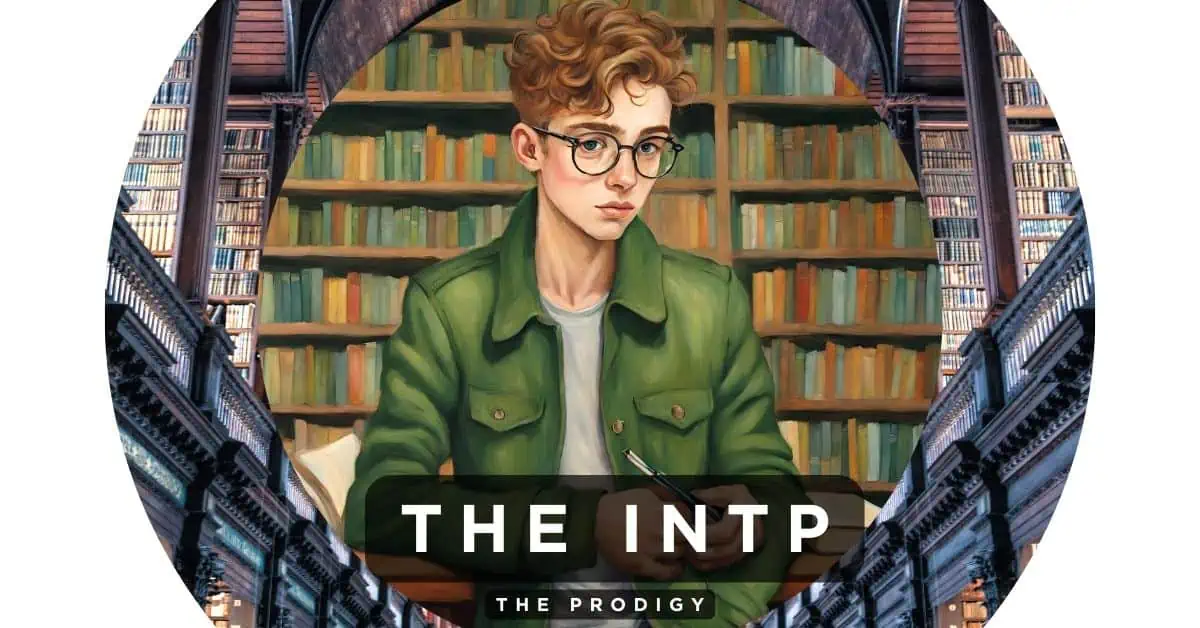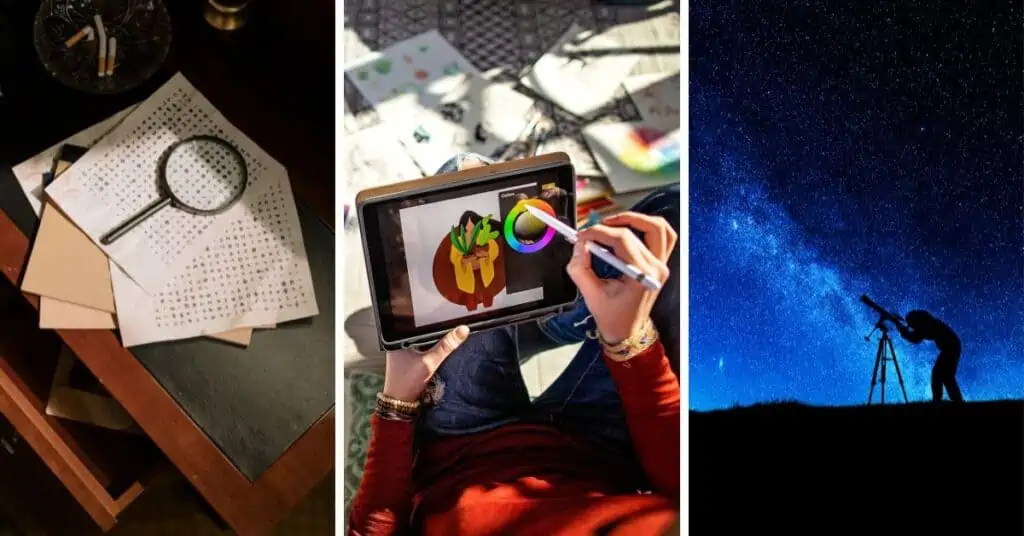The INTP “Prodigy”
INTP personality types are known for their rich intellectual curiosity and innovative ways of seeing the world. They have an endless thirst for knowledge, and love to experiment with new angles and methods of solving problems. It’s no wonder they are often called the prodigies or the logicians!
Patience is a hallmark of the INTP type. They hate to be rushed, and instead take their time to explore new depths of knowledge and information that others may have passed by in their hurry. INTPs use a powerful mental process called Introverted Thinking to analyze information, find leverage points, and weigh options when making decisions. They use their Intuition to see things from multiple angles and to bring a curiosity and open-mindedness to everything they do.
Linda Berens, a psychologist and author of The 16 Personality Types: Descriptions for Self-Discovery, said of INTPs, “For Designer Theorizers (INTPs), life is a process of becoming an expert. And they almost never feel quite expert enough. They enjoy reflecting on how things work, why they work that way, and what makes them not work and then really solving a problem, not just fixing it for now.”

If you look at the world of science, philosophy, and even politics, you will find a plethora of INTPs. People like Albert Einstein, Marie Curie, Immanuel Kant, and James Madison were all well-known INTPs.
Not sure what your personality type is? Take our personality questionnaire. Or you can take the official Myers-Briggs Type Indicator (MBTI®).
What Does INTP Stand For?
I = Introversion. “I focus inwards before responding to the outside world. It gives me tremendous energy to be alone and reflect on my own thoughts.”
N = iNtuition. “I prefer focusing on abstract possibilities and ideas rather than concrete data. I love imagining what could be rather than dwelling on what “is.””
T = Thinking. “I look at the world of logic, pros and cons, or cause and effect when I make a decision.”
P = Perceiving. “I like having a lot of options and tend to be adaptable and flexible. I like to mix work with play and prefer an exploratory approach to life.”
INTP Characteristics:
Stressors: Excessive socializing, rigid rules and structures, being in emotionally turbulent situations, constraints on creativity, having to do things “by-the-book.”
Driving Force: To analyze, categorize, and evaluate information to understand how everything works and is connected.
Back-Up Strength: To explore alternatives, generate ideas, and discover hidden meanings and interconnections.
Weaknesses: May be so focused on the logic of something that they lose sight of the human impacts of their decisions. Can be overly-critical to a fault or out-of-touch with the needs of others.
INTP Personality Traits:
While every person varies depending on their background and Enneagram type, INTPs often have the following characteristics:
- Curious and excited by novel theories and abstract concepts
- Need a great deal of alone time
- Grasp the underlying principles of how things and ideas work
- Notice logical inconsistencies
- Want to learn for learning’s sake
- Thrive on exploring new ideas and possibilities
- Enjoy understanding how things work
- Focus on being logical and unbiased in their decisions
- Consider themselves truth-seekers
- Prefer having their plans open-ended
- Dislike a lot of rules and guidelines
- Enjoy brainstorming and exploring ideas and possibilities
INTP Careers:
Independence, ingenuity, and room for creativity are all things that INTPs need in a career. Being able to develop and critique new ideas gives them a rush. They also need regular quiet time to focus, strategize, and delve into their projects in peace. Busy, highly-structured environments overwhelm them, especially if they have a supervisor looking over their shoulder on a regular basis. Being an idea-person, creating innovative solutions, and interacting with a small group of respected friends allows them to be comfortable. Delegating the nitty-gritty detail work while they work on the bigger plans and concepts is also something they appreciate.
Career Suggestions: Software developer, Scientist, Strategic planner, Computer animator, Cybersecurity specialist, Microbiologist, Economist, Architect, Intelligence specialist, Mathematician, Astronomer.
Famous INTPs:
Albert Einstein, Charles Darwin, Immanuel Kant, Abraham Lincoln, Marie Curie, Hannah Arendt, John Locke, Adam Smith, Larry Page, Sergey Brin, Jesse Eisenberg, Charlotte Gainsbourg, Richard Ayoade, Randall Munroe.
“All the interests of my reason, speculative as well as practical, combine in the three following questions: 1. What can I know? 2. What ought I to do? 3. What may I hope?”
– Immanuel Kant, a rumored INTP
INTP Cognitive Functions:

Dominant Function: Introverted Thinking (Ti)
Above all, INTPs are interested in grasping theories and underlying principles. They want to take apart the world around them and understand how it works from the ground up. The more challenging the problem, the more they are invigorated by it. Their aim is precision and accuracy, and they don’t mind taking their time to analyze an idea or rule to see it from the most objective angle. What mental process creates this hunger for truth in the INTP? Introverted Thinking, or “Ti” for short.
For the Introverted Thinker, internal order is paramount. If you’ve seen articles condemning INTPs as “lazy” or “disorganized” it’s only because observers are only focusing on the outside. Extraverted Thinking, the function employed by TJ types, is focused on organizing the outer world, while Introverted Thinking is focused primarily on organizing the internal world. They are constantly refining their mental database of ideas, theories, and facts to get more and more specific and accurate.
The INTP is an internal architect that is constantly building a framework with which to hold their ideas, theories, and truths. They invest a lot of time and energy into making decisions and making sure they’re relying on the most truthful data they can find. They don’t accept rules or facts based on tradition or social norms; instead, they constantly sift through data to see what is usable, accurate, and logical. Sometimes the conclusions they reach during this process are unpopular because pure truth doesn’t always subscribe to what’s socially “acceptable” or common. Their naturally inquisitive, skeptical nature gives them a leg up in science-related careers where their natural curiosity and depth of research is valued.
How Thinking Can Land Young INTPs in Precarious Situations:
Especially as children, INTPs often feel that they are rebuked for debating or questioning traditions and rules, when in fact they are not very combative people by nature. INTPs don’t want to push their agenda on others or force others into their way of thinking; they are independent and believe in “living and letting live.” But they’re also unwilling to compromise just to reach a consensus with others – if it doesn’t make sense to them, they can’t go along with it.
When presented with an idea, INTPs first look for any logical inconsistencies or errors that might be present. After they’ve eliminated what’s not true, then they look for what IS true. The problem here is that many people get fed up or offended when they’re in the critiquing phase. They may feel that INTPs are overly critical or tactless, but this is simply because they don’t understand their method. INTPs are just as harsh with their own ideas as they are with others, but they can’t begin to appreciate an idea until they’ve first sifted through the information to cast aside any bad data. Once the bad data is discarded they can work with the good data and see where it fits into the grand scheme of things.
Auxiliary Function: Extraverted Intuition (Ne)
When INTPs look at the world around them, they use a mental process called Extraverted Intuition, or Ne for short. Ne allows them to see endless possibilities, relationships, connections, and outcomes. It gives the INTP an eye for the future, the potential, and “the big picture”. They look for patterns and processes that are hidden from plain view, and they try to find imaginative angles and connections that other people have missed. Ne gives the INTP an optimism for the future, an ability to see what may happen or what could be, how things can transform and evolve.
Extraverted Intuition allows the INTP to “connect the dots” and see how one thing is related to another. Like a spider’s web, they see everything as interconnected. It’s as if they’re standing on a precipice overlooking the universe, viewing all the links and bonds between one thing and another. Ideas and insights jump out at them from all directions; puzzling onlookers who probably see them as just “random.” To the INTP everything is linked, nothing stands alone. They may jump from one thing to another in conversation, moving from A to Z to F to D. This can be very frustrating to sensing types who prefer a linear conversation, but to the INTP, these jumps are necessary to show the connections between their ideas.
Because INTPs see so many alternatives and unique angles, they can seem like procrastinators to many types. They can especially frustrate EJ types, who like things decided quickly. All the same, it’s vital not to rush them unless it’s absolutely necessary. They hate to be hurried along in their process; what might seem like a simple “black and white” problem to one type is really a thousand shades of gray to an INTP.
Tertiary Function: Introverted Sensing (Si)
The development of Introverted Sensing comes as kind of a surprise to those who know INTPs well. This function is nearly the opposite of Extraverted Intuition, the function we just discussed. While Ne is all about seeing new possibilities and abstract connections, Introverted Sensing (or “Si” for short) is all about using your personal experience and deriving practical, concrete applications from that.
When Introverted Sensing Develops:
INTPs usually develop Si in their 20’s or 30’s, and then it becomes a process they really enjoy using creatively or as a way to relax and find relief. Around this time, you might find that INTPs revisiting their favorite places, watching their favorite childhood movies, or listening to songs they enjoyed as a child or teen. They might suddenly develop a passion for a certain type of memorabilia or they may become more fond of repeating certain processes that they’ve learned instead of always having to try something new and different.
The young INTP is more likely to bypass Si and instead focus on intuition and trying new things, new concepts, new ways of doing everything. As the INTP develops Si they become more balanced. They still experiment with new methods, but they’ve also discovered which tried-and-true processes are worth repeating and when it’s practical to use a proven method versus experimenting.
Inferior Function: Extraverted Feeling (Fe)
Extraverted Feeling, or “Fe” for short, is the inferior function of the INTP. This tends to be an area where INTPs struggle and trip up in day-to-day life. They often feel uncomfortable using this function or stressed if they have to rely on it a great deal.
But what is Extraverted Feeling?
Fe is all about connecting with the emotions and moods of other people and maintaining morale. It’s about sensing the “emotional atmosphere” of the people around you; the social cues, customs, expectations, needs, and wants of others. People who prefer Fe (EFJs, for example) tend to be very warm, accommodating, tactful individuals. INTPs, who have inferior Fe, can struggle with knowing and understanding the emotions of other people or the needs that they are dealing with. Frequent social gatherings can feel overwhelming. Coming up with small talk? Perfecting social pleasantries? For many INTPs, this is a lot of work and feels really awkward. Often INTPs prefer a small group of close friends to large social events.
How the Inferior Function Affects the INTP During Stress
If an INTP is experiencing extreme or chronic stress, they might fall “into the grip” of Extraverted Feeling. When this happens, they start to behave unlike their normal selves; more edgy, more emotional, more expressive, more concerned with what other people think. They might have unusual emotional outbursts and lose their normal objective, logical frame of mind. This is usually a very disconcerting time for the INTP. They can feel lost, confused, and irritated at themselves because they know they are not operating in their element. You can find out more about this here.
The Healthy Development of Extraverted Feeling:
INTPs gradually develop and mature in their use of Fe as they get older, especially as they reach their 50’s and 60’s. When this happens, they become more in tune with the needs and desires of others, and they become much more concerned with making decisions that are not only logical, but address the needs of the group. They become more tactful and more capable of giving praise and warmth. As INTPs develop Fe, they suddenly realize they can be themselves, but they can also present their ideas with warmth and tact, which makes them land so much better.
INTPs in Relationships
INTPs look for relationships where they can attain emotional intimacy as well as find a mind-mate to swap ideas and theories with.
Unfortunately relationships aren’t all fun and games for INTPs. Independence is what INTPs crave, as well as ample alone time. What if this relationship will be stifling or overwhelming? What if the person needs more emotional expression than is natural? Because of these worries, Prodigies might find relationships needlessly complicated, and they may also feel ill-equipped to handle the varying emotions that come with them. Alone time is crucial to INTPs, and they worry that their partner will dominate all their time or make a lot of demands and schedules that would keep them away from their interests. It’s crucial for them to find a partner who appreciates their need for alone time and also has some of their own individual interests.
INTPs seek partners who are creative, intellectual, warm, and interested in personal growth. If their partner is independent that is a major plus! Many times INTPs find themselves drawn to individuals who have characteristics they lack. For example, as an MBTI® practitioner I see dozens of INTP/EFJ relationships. EFJs have dominant Extraverted Feeling (Fe), whereas INTPs have inferior Fe. In contrast, INTPs have dominant Introverted Thinking (Ti), whereas EFJs have inferior Ti. I’ve often wondered why I see so many of these pairings, and I think it must be a case of “opposites attracting” and each type appreciating the strengths of their partner in an area where they naturally have lower strength.
INTP Strengths:
Problem-Solvers – INTPs are good at seeing flaws in ideas and plans and seeing logical solutions to complex dilemmas. They are innovative and willing to think outside the box to find answers. Creative problem-solving energizes them, and nobody can solve a mind-bending problem with more patience!
Creative – INTPs are naturally imaginative and innovative. Doing things in new and unexplored ways is what gets them excited! They apply their creativity in many different ways; there have been groundbreaking INTP artists like J.M.W. Turner, INTP physicists like Albert Einstein, and even INTP philosophers like John Locke.
Independent – INTPs are very autonomous, intellectually independent individuals. They don’t feel the need to lean on society and are often determined to prove their competence and self-sufficiency.
Honest – INTPs pride themselves on stating the truth and using accuracy in their assessments. They don’t like to sugarcoat things or tell white lies. They believe if they respect someone that person deserves to know the truth.
Analytical – INTPs love to take problems apart and analyze them from the ground up. They are skilled at seeing abstract relationships, complicated connections, and how seemingly unrelated details tie together and can create problems or solutions. Their intellect makes them stand out as thinkers who don’t mind taking their time to get to the core of a problem.
Open-Minded – INTPs believe in “living and letting live”. They don’t like to impose rules and structures on other people and are open to new ideas, possibilities, and logical approaches. They try to keep an open mind for innovative thoughts and ideas and are usually willing to change perspectives if they are proven wrong about something.
INTP Weaknesses:
Withdrawn and Private – This isn’t always a bad thing. Being private can be good sometimes. But some INTPs repress their extraverted functions to such a strong degree that they consider all people an intrusion. They may become unhealthily reclusive or detached from their loved ones.
Overly-Critical – Because INTPs so quickly spot flaws in plans, ideas, or logical arguments they can seem overly-critical or tactless to other people. They may shoot down ideas or arguments before giving the person speaking a chance to finish their sentence or before hearing them out properly.
Procrastination – INTPs tend to second-guess themselves a lot and they can have difficulty settling on a decision or making commitments. They may put off decisions for too long and regret it later, or they may shy away from commitments that would be beneficial to them and others.
Rejection of Social Rules – Some social rules may be unimportant at times, but some INTPs, particularly in their younger years, will reject social customs and social niceties with such vigor that they leave the wrong impression with others or struggle in relationships and friendships. Yet their individuality can give them a certain rebellious charm that attracts people.
Insensitive – INTPs can get so absorbed in analyzing and critiquing that they accidentally steamroll over the feelings and emotions of people. They might be condescending towards people who are struggling emotionally or using subjective values rather than logical thought to make decisions. They might unwittingly offend people they truly care about in the process.
Fun Facts:
All facts taken from the MBTI® Manual – Third Edition
- INTPs prefer the academic subjects of art and science.
- In a national sample, INTPs were over represented in preferring the leisure activities “appreciating art” “writing””taking classes” “going to school” and “playing with computers or video games”.
- The most important job features to INTPs include creativity and originality and earning a lot of money.
- Rank highest in valuing “autonomy, freedom, independence” and lowest in valuing “religion and spirituality”.
- Highly represented among college students taking foreign languages.
- – Known for being candid, shrewd, complicated, and rebellious.













